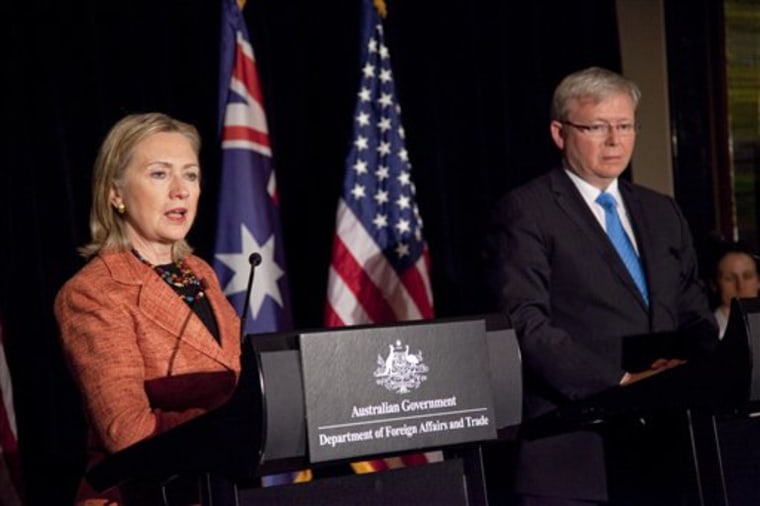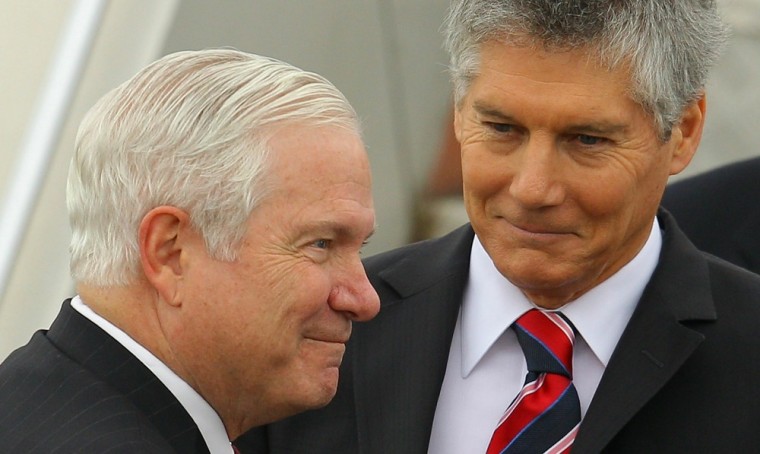The United States plans to expand its military presence in Southeast Asia and Australia, but U.S. Defense Secretary Robert Gates said Sunday the moves are "not about China at all."
However, the U.S. and Australia have been maneuvering to rein in an increasingly assertive China.
Gates, who arrived in Melbourne Sunday, said the U.S. and China share many goals in the region.
He told reporters that the U.S. does not plan any new military bases in Asia, but is looking at other ways to cooperate and expand U.S. presence. One possibility under review at a joint meeting with Australia is for U.S. forces to piggyback on existing military bases there, he said.
Gates said wider military cooperation between the U.S. and longtime ally Australia is on the table as defense and foreign ministers from both countries hold annual talks Monday.
He and Australian Foreign Minister Kevin Rudd hinted at the outline of the shared base idea but did not provide details.
Rudd said Australia would "welcome the United States making greater use of our ports and our training facilities, our test-firing ranges. That has been the case in decades past and will be the case for decades in the future."
Prime Minister Julia Gillard, quoted in SBS-TV's World News Australia, said an agreement to allow more visits by U.S. ships and aircraft would be discussed Monday.
"It does give the possibility, of course, for further joint exercises, further collaboration, that's in Australia's interest," she was quoted as telling Australia's Nine Network. The rise of China and the winding down in Afghanistan also will be on the table, she said.
The shared base idea is part of U.S. efforts to diversify its Asian military stance, which has long been focused on northern Asia. Australian bases would place U.S. forces or assets such as ships and planes much closer to potential natural disasters or conflicts in the Southern Hemisphere.

The arrangement, somewhat controversial in Australia, would probably mean more U.S. service members on Australian soil.
China claims dominion over vast areas of the Pacific that the U.S. considers international waters. China has also alarmed smaller Asian neighbors by reigniting old territorial disputes.
"It's more about our relationships with the rest of Asia than it is about China," Gates told reporters traveling with him.
The U.S. maintains large, permanent bases in Japan and South Korea, and has military facilities elsewhere in the Asia-Pacific.
The ministers will launch a study group on the shared base idea during Monday's meeting, the senior U.S. official said. The official spoke on condition of anonymity because the two nations' defense and foreign ministers have not yet addressed the issue.
Ahead of that meeting, U.S. Secretary of State Hillary Rodham Clinton, who arrived in Australia Saturday, and Rudd said their countries would expand joint military exercises and agreed to cooperate in trying to push China to take a more positive approach in its back yard.
China's smaller neighbors have grown steadily concerned about what they perceive as bullying from Beijing as it expands its influence and seeks to assert authority over large swaths of disputed maritime territory. Japan, Vietnam, the Philippines and others have competing claims with China over islands in the East and South China Seas.
Clinton said the United States would continue to press for peaceful resolutions to those claims. The U.S. claims a national security interest in protecting crucial international shipping lanes; China calls it meddling. China rebuffed a proposal Clinton made last week to host talks between China and Japan over one such dispute.
"We want to see China's rise be successful, bring benefits to the Chinese people but to take on greater responsibility and a rules-based approach towards all of its neighbors," Clinton told reporters at a press conference with Rudd.
Rudd, a former prime minister and diplomat who is fluent in Mandarin and served in China, agreed. He said both diplomacy and a joint U.S.-Australian projection of power are aimed at maintaining a strategic balance in the region.
"This is very important in shaping rules-based order and habits of cooperation and predictability of behavior within the Asia-Pacific region that is in our common interest to underpin our stability and our security for this new century," he said.
